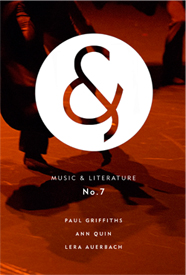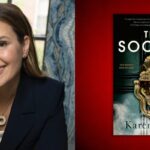
Writing a Novel Limited to the 483 Words Spoken by Ophelia
Scott Esposito in Conversation with Paul Griffiths about let me tell you
The following interview appears in Music & Literature No. 7, which is devoted to Paul Griffiths, Ann Quin, and Lera Auerbach. Paul Griffiths was born in Wales in 1947. A music critic for thirty years, he has published several books on music, as well as librettos and novels.
Scott Esposito: Your book let me tell you is a novel you wrote from the perspective of Hamlet’s Ophelia, and, in an Oulipian twist, you only use words that Ophelia speaks in Shakespeare’s Hamlet. I found the results to be quite remarkable. To start, a very fundamental question—perhaps the key question: why Ophelia?
Paul Griffiths: I began with the idea of taking all the words spoken in Hamlet and rearranging them into a new text. However, it didn’t take me very long to realize that while initially I could say almost anything with this stock of words, unless I took huge care in monitoring what I was using, I could easily end up with a highly resistant residue of archaisms and prepositions.
I therefore decided to use not all the words in the play, once each, but all the words spoken by one character, with no restriction as to number of uses. Now, if you choose Hamlet as your character, his vocabulary is so vast there’s virtually no constraint—and I needed an active constraint to make the book work. If you choose Francisco, there’s the opposite problem, of being able to say only a very little. Ophelia has enough words to express herself on all sorts of matters, but also few enough that she is constantly bumping up against the unsayable.
The constraint also allowed her to give readers the experience of reading words they have read before but are reading now in a new context. Because her mad scenes introduce a language that is unusual and therefore memorable, the reader easily recognizes, for example, where “rosemary” comes from.
Ophelia has enough words to express herself on all sorts of matters, but also few enough that she is constantly bumping up against the unsayable.
At the same time, I wanted the book to do what novels generally do: tell a story. Ophelia has one of the play’s most powerful lines: “Lord, we know what we are, but know not what we may be.” My attempt was to give her something of what she may be.
Also, and again quite aside from the constraint, here was a character who invites questions, a character who has very little opportunity to speak for herself in the play, and may now do so.
SE: Do you have a sense of how many words were available to you based on this constraint?
PG: There are 483 different words, drawn from Ophelia’s part in the Second Quarto and in the First Folio, with modernized spelling. I left out the First Quarto because its “Ofelia” is so different, and it lies outside the Hamlet tradition, but I wanted to draw on both the other texts because each has words not supplied by the other: most importantly, Q2 has “time” where F1 has “tune.”
The 483 figure counts “o” and “o’” as different words. But it strikes me now that “words” isn’t the right word, because I use these things as what one might call “letter strings,” whose possible other meanings are available—including meanings in other languages. For example, Ophelia uses “staff” to mean a stick or pole, but the same letter string (not, strictly, the same word) can also mean a group of people working for the same concern, or an element of musical notation. These are all, to use a term from linguistics, homographs. There isn’t a term for letter string, so I’m going to invent one: “grypheme.” A grapheme (existing term) notates a phoneme; a grypheme is a string of graphemes. There are 478 gryphemes in Ophelian, because the vocabulary includes five pairs of homographs (“o”/”o’” is one). The gryphemes may be combined in ways that their punctuation allows; for example, the very useful “’s” is in the play, and can therefore be applied to any word. But the gryphemes cannot be pushed together and so lose their integrity—otherwise, since Ophelia has several isolated letters (a, b, I, o, s, t), I could introduce all kinds of gryphemes not present in the original: “biotas,” for example. (I did this once; it’s very easy to spot.)
SE: I’m intrigued by the fact that you had to invent a new word for what these units that you play with are. This feels like something Oulipian practice very much succeeds at: to get us to examine language with conceptual frames no one has previously brought to it. Did you find that the creation of let me tell you began to change the ways you experienced written language?
PG: Yes, the let me tell you experience—and perhaps I should say that it took me 13 years to write the book, from 1989 to 2002—certainly had a larger impact, perhaps in encouraging a view of language as made first of words, then of meanings.
I think, also, concept can precede practice—that people are drawn, as readers and as writers, to overt form from suspicions about the ease and immediacy with which language is supposed to communicate. A spirit of play is also involved, and an openness to the seriousness of play. These things—the suspicions and the playfulness—will then no doubt be furthered by formal writing, as you suggest.
Some could observe that this entails several problems of serious importance to oneself. (One is that, as you see here, the suspicions and the playfulness are always lurking.) Writing under an imposed constraint may reinforce the lesson that all verbal communication is constrained, by the nature and traditions of the language (as you find when you try to express yourself in something other than your mother tongue), and by the individual’s knowledge of the language and habits with it. The occasion—an interview, say—may limit the language further.
A highly artificial way of writing can unlock something otherwise unavailable.
We may experience a melancholy in this, that we are not in total control of our words. But writing under deliberate constraint can also be, paradoxically, a liberation. A highly artificial way of writing can unlock, as just now, something otherwise unavailable. To take an example from let me tell you, Ophelia lacks the word “mother”—not so strange in the play, where such a character doesn’t appear and is never referred to, but bound to be odd in an autobiography. Why would she never use that word? There would have to be a reason, and that reason would have to be expressed. Hence a whole chapter, on a mother-daughter relationship I could never have imagined without the constraint.
SE: Let’s drill into this question of how writing your book “encouraged a view of language as made first of words, then of meanings.” This sounds as though you initially had an idea of there being a bunch of Platonic “meanings” sitting around, readymade, and that words were then created to be attached to those meanings; then, as you wrote the book, somehow this view changed to something like the opposite. And I wonder, first of all, did I describe that correctly? And secondly, did you begin to see “meanings” as something much more amorphous, unstable, illogical, than as these readymade things just waiting for words to become attached to them?
PG: Here’s how I think it worked. When I started, I found it very difficult to make a single well-formed sentence with the Ophelian vocabulary. It might take me an hour. There was no question of having in mind some meaning that I wanted to find words for, just of coming up with a sentence of some length that would be syntactically correct and—this is where the matter of meaning began to come in—make sense. Here’s an example from an early draft—a sentence that did not find its way into the eventual let me tell you: “He is at table, with his right hand on his knees.”
Now that I look at this again, I notice its formality (“at table”) and the questions it invites. Who is this? Is he alone? How does the narrator know what he or she reports? Presumably this “he” is eating just with his left hand, but why? Is he left-handed? Is his right hand hurt? Is this some sort of game or test?
I could have used these implicit questions to continue the narrative, perhaps with: “I could see him from where I was, right by the door, from which he was turned away. I could see he had the wish to say something, but he did not speak. There was another in there with him, a lady I could not see. There was something he had to tell this lady—that was it—something he had to say, but could not.”
As in the later stages of writing let me tell you, I find this forming itself bit by bit, without my being aware of where it’s going. No doubt what I’m about to say is too much influenced by the computer model, but it’s as if my brain were trying out all kinds of combinations with the available words, checking the results against what might plausibly follow.
You might say that let me tell you is a special case, coming out of an engagement with a body of rules. In writing as I am now—“normally,” as one might put it, or “freely”—there are no such rules and no such engagement.
However, as I’ve already indicated, I think this is a delusion. Though the rules and constraints have become invisible, because we’re so practiced in using them, they’re there, and their presence makes any piece of writing a collaboration between writer and language. This is just more obvious in such a thing as let me tell you.
Ophelia in that book is aware of all this, and yet she finds ways—not against the constraint but precisely because of its power to, as I said, unlock the unavailable—to speak of her early childhood, of her very different feelings for her two parents, of how she understands and does not understand Hamlet, and of an overwhelming experience of love.
SE: Now that we’re talking about things like the form of the interview, sentence structure, etc., being sorts of constraints in themselves, we’re in a territory that I often find myself pondering when I talk about constrained works: namely, there are constraints and there are constraints. For instance, we might look at the act of translation an a sort of exercise in constrained writing: create a text that is this mirror image of another text in a different language. But to me such a constraint feels very different than the sort of constraint you’ve employed to create let me tell you. Do you draw any lines to differentiate between various kinds of constraints?
PG: I would regard making a translation as a task, not a constraint. There are lots of tasks that writing can accomplish—a letter to your grandmother, a book review, a report to your insurance company—and they’re not constraints. A task is a limitation, of course, but it limits the subject matter or the voice, whereas a constraint places limits on form or genesis. A task entails all kinds of subsidiary tasks that will vary through the length of the piece, while a constraint is unitary or uniform, and applies in the same way right through. A task depends for its nature on some relation to the outside world—a person being addressed, or, in the case of a translation, a text being addressed—but not so a constraint.
Also, one can fulfill only one task at a time, or maybe two (a book report for your grandmother), but it’s perfectly possible to abide by several constraints. Here’s an example: “I was in no mind to lay me down with him as if it had still been as it was. How could I, now that Rich had had his say? In light of that, what could I tell him if he should come that night? I was lost in this.” That’s five constraints (other than those that are with us always), but only one task, which was to write a few sentences exemplifying five simultaneous constraints: using the Ophelian vocabulary, restricted to words of one syllable, excluding articles, and having sentences all different in length, their numbers of words divisible by five.
Participating in an interview is a task, not a constraint. The more general phenomena I was trying to describe—how phrases and sentences will seem to form themselves without the writer’s volition, how a text is partly directed by the language in which it is written—come out of constraints that are not chosen and not dependent on circumstances but everywhere and unavoidable.
I’m reminded of something Milton Babbitt said, something like: “Everyone works according to rules; I would just prefer to know what mine are.” The tendency is to regard writing under constraint as a specialist area of writing, like sci-fi or sonnets, but I would see it rather as making overt what in other writing we don’t notice.
SE: Do you feel there is a lower limit to how many words a vocabulary can have and still be viable for a novel?
PG: I reckon Ophelia’s vocabulary must be close to the limit of what is usable over the long haul. Of her 483 words, 30 or so are archaisms and many others rather rare (“unbraced,” “beauteous”). There are also near-duplications (“heaven,” “heavens,” “heavenly”) and, conversely, regions where an important element is missing, as with “mother,” or the verb “to be,” where Ophelia has virtually everything except—a significant lack in a first-person narrative—“am.”
Perhaps this is Ophelia inventing the telephone.
These clumps and gaps limit the versatility of the language, though in the same measure they give it character—and the gaps, in particular, are hugely useful in forcing solutions beyond the obvious and immediate. Ophelia cannot say, for example, “I am here,” but she could say: “See me here with you,” or “Think of me as being here.” Such locutions color the situation and suggest narrative possibilities. “Think of me as being here, but not right here with you. Think of it like this: that there could be another here, the two not touching. My words come to you from that other here. You cannot see me, where you are; you will never see me. But I may speak to you, and you may speak to me. We may speak to each other, on and on, but never see one another, each of us in our own here.” Perhaps this is Ophelia inventing the telephone.
Your question further prompted me to compare Ophelia’s vocabulary with that of Basic English. Of the 850 words in the latter’s “core vocabulary,” she has 166 by my count, i.e. 20 percent. And her slice of the pie is in practice even smaller than that, for Basic English counts all forms of a verb as representatives of one word, so that “come” in Basic English includes “comes,” “coming,” and “came,” whereas Ophelia has only “come” and “comes.” The same goes for singular and plural forms of nouns. Ophelia normally has one or the other, and the rare cases where she has both are not always the luckiest: “watchman/watchmen,” for example. So she’s working with maybe 10 percent or less of the vocabulary that would be available to her in Basic English, plus about 300 words of limited usefulness.
I’d expect this is near to the limit for writing a narrative of close on 40,000 words. I hope it is, as my intention was to work at that point where continuous prose is still just feasible, where there could be, at the same time, versatility and strain.
To tighten the screws further, one might have to go to, say, Guildenstern, who has just 175 words and probably no more than five per cent of Basic English. “Believe me,” says Guildenstern, “and it is some affliction to find you do not have the word for the very thing you would most love to say!” And he’s right. I would not like to have to write a whole novel in Guildensternian, quite apart from the fact that he isn’t, poor chap, such a fascinating character.
SE: At times in the book you add another constraint on top of the Ophelian vocabulary, as, for instance, when you compose the sonnets that are found in let me tell you. Is this something you have been interested in experimenting with, adding localized constraints into more generally constrained works?
PG: There are several subsidiary constraints in let me tell you. Some of them are quite evident and, as I see it, integral to the experience of reading the book.
But other sub-constraints are less apparent. For example, I took it that the primary constraint, that Ophelia is limited to the words she has in the play, would be global, i.e. that all the characters would be similarly constrained to their vocabularies in the play—except that, because they’re expressing themselves within Ophelia’s narrative, they’re constrained to the intersection of their vocabularies with hers, to the words they hold in common. For example, one chapter includes several letters from Polonius, and these use only words that are spoken in the play both by Ophelia and by him.
These letters, which she quotes in an entirely positive light, showing how fond she is of her father, allow her unknowingly (though, of course, we know) to anticipate and defuse one of the most disturbing moments in the play, when Polonius reads out to the royal couple a letter to her from Hamlet.
Other characters, too, use only the vocabularies they share with Ophelia. This comes to the surface in a dialogue that has Ophelia inviting Gertrude to consider the words she is using, the words they have in common (as women, we might want to add).
One reason to work with these further restrictions was to up the ante, make the writing even more difficult and the result, in some cases, more comic, for humor is often another happy product of constrained writing. But also, I felt that Polonius and the rest could not properly be themselves in my book if they used words that were not theirs. And then there were often curious features of these various intersections, as with the Ophelia-Gertrude example. For instance, of the six characters with whom I was concerned—the only ones Ophelia has any possibility of mentioning, namely Hamlet (his is the only name she has, but she can also call him “the young lord”), Claudius (“the king”), Gertrude (“the king’s lady”), Polonius (“my father”), Laertes (“my brother”), and Ophelia herself—only Claudius lacks “god.” 156 of Ophelia’s words, almost one in three, are unique to her among these characters, words that include “morning” and “profound” and “composed” and “key,” as well as the more easily predicted “rosemary” and “paconcies.” Words that she shares only with Hamlet are also quite interesting: “answers,” “glass,” “sing,” “yours,” and so on.
However, I didn’t feel I could make up words for the most celebrated and surely most enigmatic character in our literature, and so in let me tell you Hamlet never speaks in propria persona, only when he’s taking part in the play scene, which I thought had to be there, as in the source text. Hamlet’s silence then becomes one of the features of the book. And to keep him off center, but of course looming, I had Ophelia use the grypheme of his name only once.
Of the approximately 1,170 words Ophelia speaks in the First Folio edition, 480 (41 percent) come in her mad scenes, and nearly all the rest are to do with Hamlet… In let me tell you, she gets the chance to talk about other people.
She has, nevertheless, a whole chapter on him, the longest in the book. I should say that, because Ophelia’s vocabulary offers very few possibilities for indicating the passing of time, many of the chapters implicitly show her at different ages by concentrating on her relationship with one other person. With Laertes, she is a young child, and the chapter is punctuated by nursery rhymes that cannot properly be completed. With Hamlet, she is an adolescent, beginning to gain an adult’s understanding.
Her preoccupation with Hamlet is, of course, another matter cued by the play. Of the approximately 1,170 words Ophelia speaks in the First Folio edition, 480 (41%) come in her mad scenes, and nearly all the rest are to do with Hamlet, whether she’s talking about him to her brother and her father, placed with him in their single two-handed scene, expressing her concern to the queen, or surviving his teasing in the play scene. In let me tell you, she gets the chance to talk about other people.
Some of them are characters I added to the cast, like the mother. The other important ones are the Polonius family’s maid and a wise woman, the Lady Profound. Part of their function is to alert Ophelia to the fate awaiting her—the maid outlines to her the whole action of the play—and the story of the book then becomes one of whether she will or can escape that fate.
Despite these additions to the dramatis personaæ, there are very few people in let me tell you, which takes place largely in a world quite separate from the court where Hamlet will unfold. Again created partly by the vocabulary, it is a natural world, close by a mountain (“White his shroud as the mountain snow,” Ophelia sings in the play, “Larded with sweet flowers,” introducing words crucial to how her environment is depicted in let me tell you). Only in the penultimate chapter does Ophelia go to the royal residence–and then, in the final chapter, beyond.
You mention the sonnets. Each of these begins with a iambic pentameter from a Shakespeare play, a line that Ophelia could have spoken. An example is “I cannot tell what you and other men,” which is spoken by Cassius to Brutus in Julius Caesar.
It just occurs to me that it might be interesting to go through Hamlet with a view to how much of it Ophelia could say—even translate it into Ophelian. Here, for example, is one moment: “To be, and not to be: are these the answers, then?”
There are also constraints in let me tell you that have nothing to do with vocabularies. For example, a couple of songs are set to a tune that seems to have been in Shakespeare’s head from time to time, not least when he was writing for the distracted Ophelia.
SE: Do you have any information on how many times you use each of Ophelia’s words in let me tell you?
PG: I don’t know too much about word frequencies in let me tell you, but some work was done on this by a Shakespeare scholar in England, Peter Kirwan. It was difficult enough to write this book with the vocabulary involved, and with the further restricted vocabularies of the other characters, without adding too many constraints with regard to how often or when particular words could be used. Some, though, there were.
They fall into two groups. First, because I’d made it a rule that the book would have to include Ophelia’s vocabulary in toto, I had to find uses for some tricky customers.
Limiting the use of archaic words and contractions I don’t regard as a constraint, more a necessity. For instance, if the book were to read as being in something like modern English, I had to limit the appearance of old forms of the second person singular pronoun: “thee,” “thou,” “thy.” Happily, there are parts of England where these forms are still just about current, and so I could give them all to the maid with the implication she came from such a region. Things like “gyved” and “gis” also had to be naturalized in some way.
There were words I did manage to measure out—which you can only do if you’re dealing with a fixed vocabulary. There are not many of these—only three—and they are for the reader to discover. One becomes the last word in the book. On the level of form, it’s like the capstone on a pyramid; the pattern is now complete. At the same time, again in a formal sense, it’s a kind of hinge, between what Ophelia has said and what she has not yet said, the point where the book meets the non-book. Being so crucial, it had to be a word, too, that would carry a weight of meaning and implication.
SE: How was it that you became intrigued by the possibility of working Oulipian constraint into your work? What were your first experiments with this method?
PG: You invite an autobiographical answer, which I am happy to supply, in order to give credit where it is due. We have to go back to my second year in high school, 1959-60, when our English teacher was John A. Hall. One week, our assignment from him was to write a story in which six objects were to appear: a broken television tube, a bubble car (already there is a sense of the period), a green-eyed yellow idol, and I can’t remember what the other three were. I, at the age of 11 or 12, thought this was absurd and even demeaning—a totally arbitrary cramp on our imaginations and a joke he was playing on us. Just the same, I quite enjoyed writing my story, and arriving at the required objects either stealthily or with panache. The big surprise, however, came at the next lesson, when he invited several of us to read out our stories. They were all completely different. More than that, I could recognize, in the story one of my friends had come up with, how it spoke of him, of his personality.
That was my first experience of writing under constraint. At almost the same time, a certain literary group was being founded in Paris, but I don’t think I had any awareness of the Oulipo until the later seventies, when I discovered Calvino, and I knew nothing of Perec until the English translation of La Vie mode d’emploi came out, in 1987. Calvino and Perec, and a few others, made it possible to stand up again after being bowled over by Beckett.
SE: That’s really quite a surprise, that the first you heard of Perec was when David Bellos’s translation of La Vie mode d’emploi arrived in 1987. I believe that was the first of Perec to be translated into English, and this certainly speaks to how important translation is to the movement of culture across national and linguistic boundaries. Could you share with us some of those translations that were especially meaningful to you during that period?
PG: #1: Shakespeare. Not a translation, you may say, but reckonable here because, though my mother took me to my first Shakespeare play when I was eight, and though I read the canon two or three years after that, my introduction was by way of the Lambs’ recounting of many of the plays as tales.
#2: Homer. I encountered the Iliad during this same period by way of “Classics Illustrated,” a US series delivering high literature by way of comic books, which I seized on. There they were, at the newsagent’s, in a not at all affluent part of a largely practical city (Birmingham), ready to open the universe to anyone who could come up with sixpence.
Because of that introduction, I was primed to move on a little later to E.V. Rieu’s prose translations of both the Homeric epics for Penguin Classics, and through that imprint to so much more.
#3: Hugo. Another issue of “Classics Illustrated,” The Hunchback of Notre Dame, powerfully troubled me not so much for the images of the title character as for the offstage presence of something utterly strange to me, something that, of course, I could later identify as sex. This was another kind of introduction, to the category of books that, ringed with fire, you will never read, never be able to open.
#4: Beckett. Waiting for Godot at the Oxford Playhouse when I was 18 or 19 made me read everything of his I could find.
#5: Borges. He came to Oxford in 1971 to receive an honorary doctorate. I missed seeing him, but I bought a copy of Fictions—and then, again, everything else available.
#6: Calvino. Not sure how I found this one. Certainly I was ready at the bookshop when If on a winter’s night… came out, in 1981. And I remember reading Mr. Palomar when it was new, four years later, on the sidewalk on Fifth Avenue, right outside Scribner’s Bookstore (currently a cosmetics outlet).
#7: Perec. Unknown to me before the appearance of Life, a User’s Manual, in 1987. Or perhaps, rather, there was a big space in my mind waiting for him to fill.
SE: I’d like to ask you about the short note appended to the start of the book, ostensibly the words of Claudius, the King. It is a very curious thing, as Claudius discloses that they all are participants in a “play,” and he acknowledges that “we all have no more than the words that come to us in the play. We go on with these words. We have to.” It reminds me very much of the strange piece appended to the end of Coetzee’s Elizabeth Costello, which similarly breaks down the “fourth wall” as it were and hits similar notes about the trap that is language. Do you see a sort of liberation from the fact that we are in, in a manner, stuck with the words that come to us?
PG: I didn’t intend to have such a preface, feeling that, if the thing ever got published, it would be known as “the novel in Ophelian,” just as nobody needs to be told that La Disparition lacks the letter “e.” However, when Harry Mathews said there should be a preface, I thought I had to do it, and so I came up with the idea of giving it to Claudius to voice. He, of course, can name Ophelia. Other characters could, too, but Claudius seemed the right choice, for several reasons. One was simply that he could sign his preface, as “The King”—words that also appear in Ophelian, so that the signature could be a kind of hinge (again) into the main body of the narrative.
Thanks for the mention of Coetzee, whom of course I admire immensely. I have a first U.S. edition of Elizabeth Costello (2003), and I think I wrote Claudius’s preface in 2005, so the example may have been at the back of my mind. More to the front was Pagliacci.
Yes, Claudius has stepped out from the play, in a move he feels to be highly unusual and dangerous. Ophelia is by no means so obviously aware of being a play character; indeed, the matter of her awareness is central to her course through the book. Breaking down the fourth wall, as you put it—demystifying the experience, inviting the audience to engage with the work as an artifact, letting people in on what you’re doing—is a big part of what I (and I am hardly alone here) feel to be part of the inheritance. Constrained writing offers valuable help in this; the reader stands informed of the project and the means.
The liberation, or the stimulus to find things you never could have found any other way, is a whole other side of it, and I’ve already remarked on this. But what I haven’t mentioned is how the constraint validates some very simple things, things that it’s very hard now to express, given the age of our literature, but that, because they come out of the constraint, can be said again, freshly, and can even make their mark again, freshly. It’s an example of how a highly artificial mode of writing can come up with things that seem natural, fundamental, unmediated.
SE: When I think of the very best writing, economy comes to mind as a principle factor. I feel like this is a thing a writer often reaches indirectly, arriving there, as it were, with some sort of help, or only after a long period of work and development. let me tell you strikes me as a very, very compressed text. What is the effect of constraint on economy in your literature?
PG: Thank you for mentioning the compression of let me tell you. I think this does come from the constraint, in several ways. Most straightforwardly (in a sense), the constraint decelerates the writing process, so that all kinds of thoughts and angles come into consciousness in the course of putting together a single sentence, and perhaps some of that mental activity will be reflected in the sentence. Secondly, the constraint may force a slightly oblique or unusual or otherwise particular turn of phrase, which may, by those qualities, imply more than it states. The very first sentence of let me tell you could be an example: “So: now I come to speak.” This has, I hope, the sense of a forcible beginning (people often use “so” in this way: “So, how did you two get together?”), but also it places an emphasis on the first person singular pronoun and suggests, by the phrase “come to,” a length of time during which this person was not speaking, leaving it open whether her silence was chosen or enforced. Thirdly, the constraint made it exceedingly difficult to write long sentences, such as I often like to do, and that fact alone may give the text compactness. The average sentence length in let me tell you is 12.4 words, whereas in an earlier piece of fiction of mine it’s 30.3 words. Also under this heading, the constraint allowed or encouraged me to write some very short sentences, such as the second in the book: “At last.” Because this amplifies what has just been said, there’s a close interlocking of the two sentences, and that, too, will tend to increase the concentration.
On a possibly less elevated plane, I learned a lot about economy through working as a newspaper music critic, constantly between the ages of 24 and 44.
SE: I’ve noticed that throughout this interview you have used the terms, Ophelian, Claudian, Gertrudian, etc. Do you to some extent consider these languages, or linguistic systems? Do you continue to write in them? And I’m curious if by now you’re able to compose in Ophelian without having to check your words against any sort of a list, whether you have a feel for what it is and how it sounds, what is possible in it and what is not.
PG: Indeed I have come to feel Ophelian to be a language in itself, and not just a small and scattered subset of English. I have had these words in my head for such a long time that I know how they play, where they wish to go, and where they cannot. And you may see, as you take in these words, that they have a way of their own. As just there, I can switch into Ophelian with a lot more facility than at the start, more than 25 years ago—though I do still have to check the wordlist occasionally—and yes, I have gone on writing in this language from time to time, anything from little sketches to another whole novel, similar in length to let me tell you and nearing completion.
A constraint opens up a whole field of potential literature.
I’d also like to point out the often overlooked aspect of Oulipo contained in the “po” bit: Ouvroir de littérature potentielle. A constraint—and this is another way in which it’s a liberation—opens up a whole field of potential literature. La Disparition instances the novel-without-an-e, creating a type that includes forerunners (Ernest Vincent Wright’s Gadsby and others that might come to light) and successors; on a larger plane, it introduces the lipogrammatic novel more generally, so that a novel without an “a,” or a novel without a “t,” or a novel with neither “a” nor “t,” would all be part of its progeny. Of course, the potential does not have to be realized; it exists even if nobody writes a lipogrammatic novel again. In a similar way, let me tell you instances the novel in Ophelian and, beyond that, the novel in a vocabulary taken from some other character, whether in Hamlet, in Shakespeare, or in another source, or limited in a different way—and not only the novel but any piece of writing. One might imagine a philosophical or theological treatise in Ophelian, or an epic poem, or a book of children’s stories. I would be curious to see what someone else might come up with writing in this language; perhaps another writer would find totally different ways of using it. However, nobody since Perec has, as far as I know, published a lipogrammatic novel, so perhaps in the Ophelian case, too, the potential will remain potential.

The following interview appears in Music & Literature No. 7.
Veronica Esposito
Veronica Esposito is a writer and transgender advocate. She worked with literary translation in multiple capacities for over a decade before choosing to serve her community through peer support. She is currently working toward a masters in counseling. The author of four books, her publications include The Guardian and The New York Times.



















